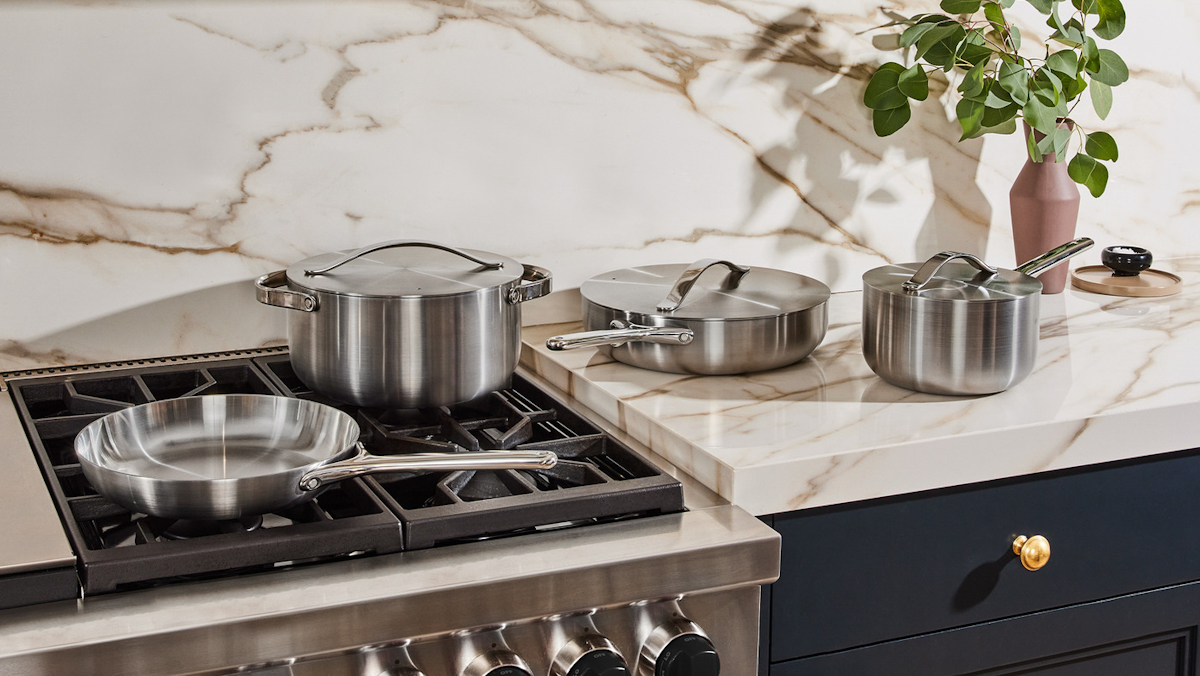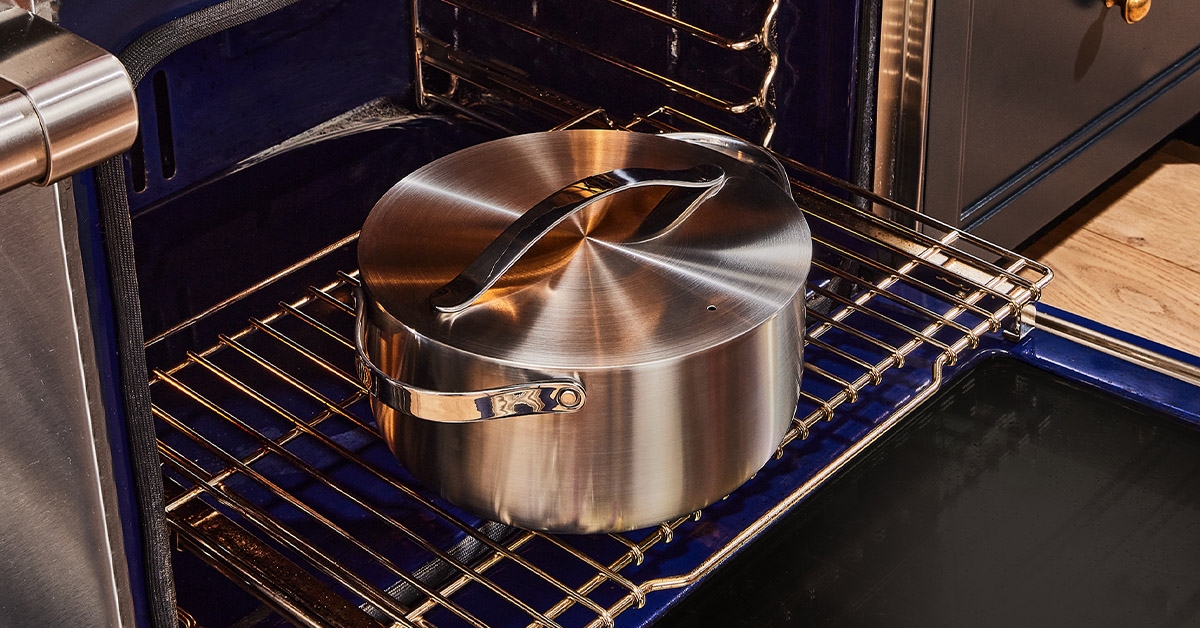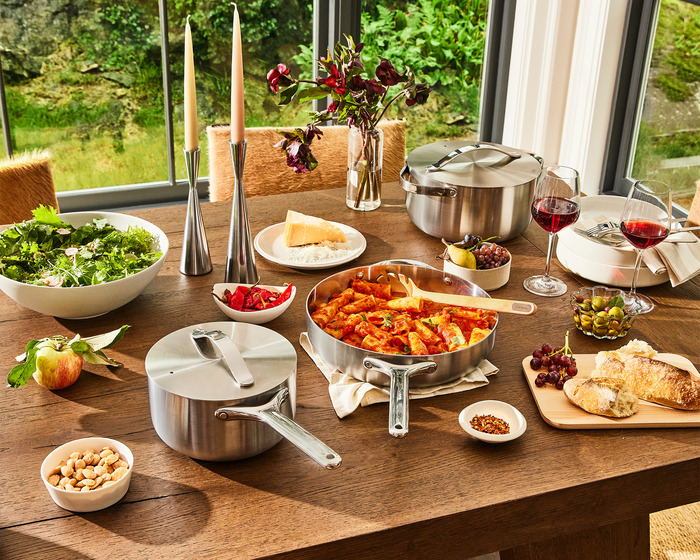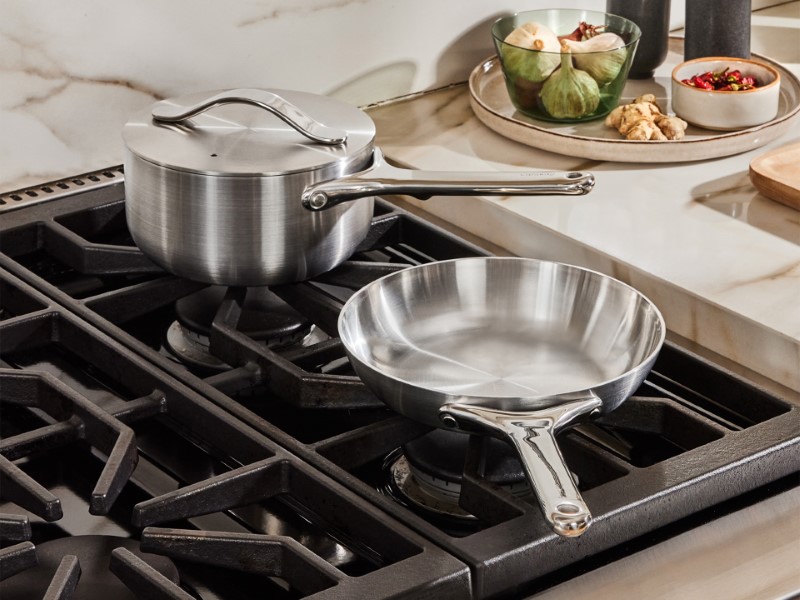You have no items in your cart
Shop our collectionsFree Shipping On Orders $90+
Free Returns
30-Day Trial
Home & Kitchen with Caraway

At Caraway, we understand the modern home cook's dilemma: the balance between durability and the peace of mind of using non-toxic materials. It's why we've committed ourselves to crafting cookware that doesn't compromise on safety or performance.
Navigating through cookware options can be daunting, but understanding the materials your food comes in contact with is crucial. That’s where stainless steel comes into play.
Stainless steel has long been the material of choice for those seeking reliability and longevity in their kitchen arsenal.
Here's why Stainless Steel by Caraway not only meets but exceeds expectations:
Unlike other materials that might chip, stain, or deteriorate over time, stainless steel withstands the test of daily use, maintaining its integrity and appearance for years. Our stainless steel cookware is built to last, promising countless meals without a hitch.
One of the greatest advantages of stainless steel is its non-reactive nature . Whether you're simmering tomatoes or deglazing with vinegar, our cookware ensures your food's flavor remains untainted, and no harmful substances migrate into your meals.
The core of our stainless steel cookware is designed for even heat distribution, eliminating hot spots that could lead to uneven cooking or, worse, burnt food. This feature is critical for achieving that perfect sear or gently simmering a delicate sauce.
Our stainless steel range is as straightforward to clean as it is to cook with. It resists corrosion and doesn’t harbor bacteria, making post-cooking cleanup a breeze.
We’re committed to not only your health but also the health of our planet. Stainless steel is not only durable, reducing the need for frequent replacements, but also recyclable, aligning with our mission for a more sustainable world.

While stainless steel cookware is celebrated for its numerous benefits, it's important to address some concerns that occasionally surface. Let's demystify these and reassure you why our stainless steel cookware stands above these apprehensions:
A concern often voiced is the potential for metals like nickel and chromium to leach into food, especially when cooking acidic dishes. It's important to note that this is highly dependent on the quality of the stainless steel.
Caraway uses high-grade stainless steel with minimal risk of leaching, ensuring that your food remains safe and uncontaminated. Our cookware is rigorously tested to meet and exceed safety standards, providing peace of mind in every meal.
Some worry about stainless steel's ability to distribute heat evenly, fearing hot spots that lead to uneven cooking. Our stainless steel cookware is engineered with a core that ensures even heat distribution, eliminating these concerns. This design promotes uniform cooking and reduces the risk of overheating and potential food safety issues.
The myth that stainless steel is hard to clean or maintain persists. However, our stainless steel cookware debunks this myth with surfaces that resist corrosion and staining, making them incredibly easy to clean.
While stainless steel does not have the same non-stick qualities as coated pans, a proper preheat and a bit of oil can make cooking and cleanup just as easy without the health concerns associated with chemical non-stick coatings.
Unlike traditional non-stick cookware that often contains harmful chemicals like PFOA and PTFE , stainless steel is naturally free from these substances. We take this a step further by ensuring that every aspect of our cookware—from the core to the surface—is free from any harmful chemicals, making them a safer choice for you and your family.

While stainless steel is a cornerstone of non-toxic, durable cookware, it's part of a broader spectrum of safe materials that conscientious cooks can rely on.
Here's a look at other safe cookware materials that stand shoulder-to-shoulder with stainless steel in your culinary arsenal.
At Caraway, we've harnessed the power of ceramic to offer a modern take on non-stick cookware. Unlike traditional non-stick surfaces coated with PFOA or PTFE, our ceramic-coated cookware is crafted with a naturally slick surface that's safe and effective for low-oil cooking.
It’s an excellent conductor of heat, ensuring even cooking, and its varied color options add aesthetic appeal to any kitchen.
Revered for its rustic charm and unparalleled heat retention, cast iron is a heavyweight champion in the kitchen. When seasoned properly, it boasts a natural, non-stick surface, free from synthetic coatings.
Its ability to go from stovetop to oven makes it versatile, and with minimal care, cast iron can last generations. Plus, it adds a small amount of beneficial iron to your diet.
In the pursuit of a well-equipped kitchen, it’s just as important to know what to avoid as it is to know what to embrace. With safety and sustainability at the forefront of Caraway’s mission, we’re here to guide you through the maze of cookware materials that might not make the cut for health-conscious and eco-friendly cooking.
The convenience of non-stick pans is undeniable, but the traditional coatings—think PFOA and PTFE (yes, the infamous Teflon®)—carry some health concerns. When overheated, these coatings can release harmful fumes, posing a risk to your health and the environment.
Caraway sidesteps these issues by offering a ceramic-coated alternative that’s both non-toxic and effective, ensuring you can still enjoy the ease of non-stick cooking without the chemicals.
Aluminum’s excellent heat conductivity makes it a popular choice, but its potential for leaching into food raises eyebrows, especially when cooking acidic dishes. While anodized aluminum reduces this risk, the conversation around its safety continues.
However, we at Caraway utilize aluminum between our layers for heat conductivity. This construction allows the cookware to heat up quickly and evenly distribute heat throughout the pan without the risk.
Plastic’s convenience in the kitchen is hard to dispute, but its exposure to high temperatures can lead to the leaching of BPA and other plasticizers into food. Not to mention, the environmental impact of plastic is far from benign.
Opting for more durable and heat-resistant materials like wooden cooking utensils not only elevates your cooking experience but also aligns with a sustainable lifestyle.
Maintaining the safety and longevity of your cookware goes beyond the initial purchase.
Here are some fundamental tips to ensure your cooking tools remain in top condition, safeguarding your health and enhancing your culinary experience:
Regular Maintenance: For all cookware types, regular maintenance is key. This includes proper cleaning after each use and routine seasoning for materials like cast iron to preserve its non-stick qualities. Use Appropriate Utensils: Metal utensils can scratch and damage the surface of non-stick cookware. Opt for silicone or wooden tools to keep your pots and pans scratch-free and performing well.
Storage Solutions: Store your cookware properly to avoid damage. Hanging pots and pans can prevent scratching and denting, and stacking them with a layer of protection between each piece can preserve their surface. Caraway’s stainless steel cookware comes with its own organizer to ensure safe storage.
Avoid Abrasive Cleaners: Harsh cleaning agents and abrasive scrubbers can wear down cookware surfaces over time. Gentle dish soap, warm water, and a soft sponge are usually all that’s needed to keep your cookware clean and safe.
By following these simple care guidelines, you can extend the life of your cookware and ensure it remains safe and effective for cooking.

At Caraway, we believe the right cookware does more than just cook your food. It contributes to your health, enhances your culinary adventures, and respects the environment.
Our journey through the world of safe cookware materials underscores our commitment to offering products that not only meet but exceed your expectations for performance, safety, and sustainability.
From the unparalleled durability and safety of our stainless steel to the innovative, non-toxic technology behind our ceramic cookware, Caraway is dedicated to enriching your kitchen with only the best. We know that with the right tools, cooking becomes not just a daily task but a joyous exploration of flavors and a meaningful contribution to a healthier planet.
Thank you for choosing Caraway, where your culinary journey is safeguarded with the highest standards of safety and quality.
Sources:
What Is the Difference Between Reactive and Nonreactive Pans | Martha Stewart
Undisclosed PFAS coatings common on cookware, research shows | Ecology Center
Cast iron | Definition, Composition, History, & Facts | Britannica
Free Shipping On Orders $90+
Free Returns
30-Day Trial
Spend $675 more for a free gift!
Caraway & MATE Sweatshirt
Spend $675
Spend $675 more for a free gift!
Exclusive gift with orders $675+
Caraway & MATE Sweatshirt